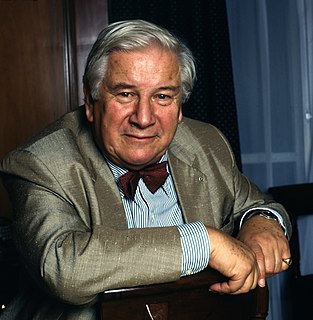A Quote by Peter Ustinov
Her virtue was that she said what she thought, her vice that what she thought didn't amount to much.
Related Quotes
She was beautiful, but not like those girls in the magazines. She was beautiful, for the way she thought. She was beautiful, for the sparkle in her eyes when she talked about something she loved. She was beautiful, for her ability to make other people smile, even if she was sad. No, she wasn't beautiful for something as temporary as her looks. She was beautiful, deep down to her soul. She is beautiful.
One of my mentors was Patricia Schroeder, and one night she came to me on the floor and she said to me, "Why are we sitting in Congress, when a lot of women would try to do it and couldn't? Why are we here and others aren't?" And I thought back and said it was because my father believed in me and she said the same thing, she said her father believed in her and thought she could do anything.
When she liked anyone it was quite natural for her to go to bed with him. She never thought twice about it. It was not vice; it wasn't lasciviousness; it was her nature. She gave herself as naturally as the sun gives heat or the flowers their perfume. It was a pleasure to her and she liked to give pleasure to others.
She sits in her usual ample armchair, with piles of books and unopened magazines around her. She sips cautiously from the mug of weak herb tea which is now her substitute for coffee. At one time she thought that she could not live without coffee, but it turned out that it is really the warm large mug she wants in her hands, that is the aid to thought or whatever it is she practices through the procession of hours, or of days.
She lay on her back and walked her fingers down her ribs, skipped them over her abdomen, and landed on her pelvic bones. She tapped them with her Knuckles. [. . .] I can hear my bones, she thought. Her fingers moved up from her pelvic bones to her waist. The elastic of her underpants barely touched the center of her abdomen. The bridge is almost finished, she thought. The elastic hung loosely around each thigh. More progress. She put her knees together and raised them in the air. No matter how tightly she pressed them together, her thighs did not touch.
Sophie has a gift," she said. "She has the Sight. She can see what others do not. In her old life she often wondered if she was mad. Now she knows that she is not mad but special. There, she was only a parlor maid, who would likely have lost her position once her looks had faded. Now she is a valued member of our household, a gifted girl with much to contribute.
And when she started becoming a “young lady,” and no one was allowed to look at her because she thought she was fat. And how she really wasn’t fat. And how she was actually very pretty. And how different her face looked when she realized boys thought she was pretty. And how different her face looked the first time she really liked a boy who was not on a poster on her wall. And how her face looked when she realized she was in love with that boy. I wondered how her face would look when she came out from behind those doors.
I found her lying on her stomach, her hind legs stretched out straight, and her front feet folded back under her chest. She had laid her head on his grave. I saw the trail where she had dragged herself through the leaves. The way she lay there, I thought she was alive. I called her name. She made no movement. With the last ounce of strength in her body, she had dragged herself to the grave of Old Dan.
What about Isabelle?" Simon asked. "Where is she?" The humor, such as it was, left Jace's expression. "She won't come out of her room," he said. "She thinks that what happened to Max was her fault. She won't even come to the funeral." "Have you tried talking to her?" "No," Jace said, "we've been punching her repeatedly in the face instead. Why, do you think that won't work?" "Just thought I'd ask." Simon's tone was mild.


































